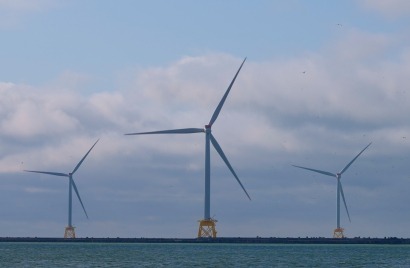
Demand for electricity is soaring, driven by digitalization, urbanization and the electrification of transport. Simultaneously, the need for decarbonization in the face of climate change has never been more apparent. Enter AI, a transformative technology with huge potential.
However, while AI's problem-solving capabilities are undeniable, it's also creating new challenges, most notably an unprecedented appetite for electricity. As energy systems become more complex, there's a greater need for information sharing and more powerful tools to plan and operate these evolving systems. This is where the synergy between AI and renewable energy becomes not only beneficial, but essential.
The scale of AI's energy consumption is staggering. Goldman Sachs Research estimates that by 2030, data center power demand will increase by 160%, with AI playing a major role in this rise.
This emergence in demand presents a paradox: how can we support the growth of AI while meeting climate targets?
The answer could lie in the very technology driving this increased demand. While AI is energy intensive, it also holds the key to optimizing renewable energy systems and accelerating the energy transition. Industry insiders argue that AI is driving the construction of renewable energy sources, particularly in the wind, solar and nuclear sectors. In addition, AI can significantly improve renewable energy infrastructure by increasing efficiency and predictability.
One of the most promising applications of AI in the renewable energy sector is overcoming the challenge of intermittency. The intermittent nature of wind and solar power has long been a barrier to widespread adoption. AI-powered predictive maintenance and grid management systems are revolutionizing the way we manage these fluctuations, ensuring a more stable and reliable energy supply.
Battery storage, critical to solving intermittency issues, is another area where AI is making significant strides. By optimizing charge and discharge cycles and predicting energy demand patterns, AI is helping to create more efficient and effective energy storage solutions.
As we navigate this new landscape, it's clear that the success of both AI and renewable energy depends on their ability to complement and support each other. The renewable energy sector needs to scale up rapidly to meet the increasing demand from AI and other technologies. At the same time, AI-led innovation is key to supercharging the efficiency and reliability of our energy systems.
The alliance between AI and renewable energy represents a pivotal moment in our journey towards a sustainable future. While challenges remain, the potential benefits of this partnership are immense. By harnessing the power of AI to optimize renewable energy systems, we can create a more efficient, reliable and sustainable energy infrastructure capable of meeting the demands of our increasingly digital world.
By Mark Johnson, VP Operational Excellence, JERA Nex

